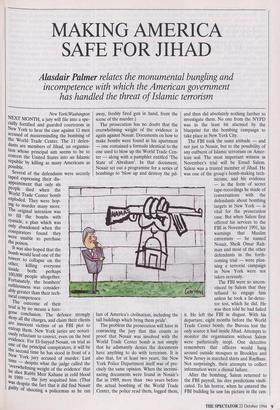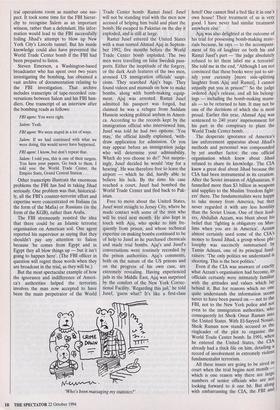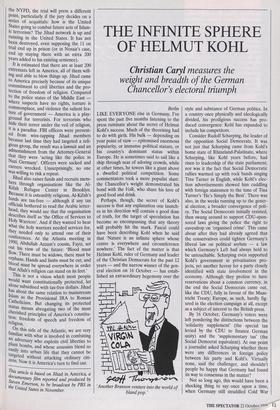MAKING AMERICA SAFE FOR JIHAD
Alasdair Palmer relates the monumental bungling and
incompetence with which the American government has handled the threat of Islamic terrorism
New York/Washington NEXT MONTH, a jury will file into a spe- cially fortified and guarded courtroom in New York to hear the case against 11 men accused of masterminding the bombing of the World Trade Center. The 11 defen- dants are members of Jihad, an organisa- tion whose principal aim seems to be to convert the United States into an Islamic republic by killing as many Americans as possible.
Several of the defendants were secretly taped expressing their dis- appointment that only six people died when the World Trade Center bomb exploded. They were hop- ing to murder many more. The original intention was to fill the bombs with cyanide, a plan which was only abandoned when the conspirators found they were unable to purchase the poison.
It was also hoped that the bomb would lead one of the towers to collapse on the other, killing everyone inside both: perhaps 100,000 people altogether. Fortunately, the bombers' ruthlessness was consider- ably greater than their tech- nical competence. The outcome of their trial is by no means a fore- gone conclusion. The defence strongly deny all the charges, and claim their clients are innocent victims of an FBI plot to entrap them. New York juries are notori- ously reluctant to convict, even on the best evidence. For El-Sayyed Nosair, on trial as one of the principal conspirators, it will be the second time he has stood in front of a New York jury accused of murder. Last line — despite what the judge called the `overwhelming weight of the evidence' that he shot Rabbi Meir Kahane in cold blood in 1989 — the jury acquitted him. (That was despite the fact that it did find Nosair guilty of shooting a policeman as he ran away, freshly fired gun in hand, from the scene of the murder.) The prosecution has no doubt that the overwhelming weight of the evidence is again against Nosair. Documents on how to make bombs were found in his apartment — one contained a formula identical to the one used to blow up the World Trade Cen- ter — along with a pamphlet entitled 'The State of Abraham'. In that document, Nosair set out a programme for a series of bombings to 'blow up and destroy the pil- lars of America's civilisation, including the tall buildings which bring them pride'.
The problem the prosecution will have in convincing the jury that this counts as proof that Nosair was involved with the World Trade Center bomb is not simply that he adamantly denies the documents have anything to do with terrorism. It is also that, for at least two years, the New York Police Department itself was of pre- cisely the same opinion. When the incrimi- nating documents were found in Nosair's flat in 1989, more than two years before the actual bombing of the World Trade Center, the police read them, logged them, and then did absolutely nothing further to investigate them. No one from the NYPD was in the least bit alarmed by the blueprint for the bombing campaign to take place in New York City.
only source it had inside Jihad. Attempts to monitor the organisation without Salem were pathetically inept. One detective remembers that officers would hang around outside mosques in Brooklyn and New Jersey in starched shirts and RayBans. Not surprisingly, their attempts to collect information were .a dismal failure.
After the bombing, Salem returned to the FBI payroll, his dire predictions vindi- cated. To his horror, when he entered the FBI building he saw his picture in the cen- tral operations room as number one sus- pect. It took some time for the FBI hierar- chy to recognise Salem as an important witness, rather than a defendant. His infor- mation would lead to the FBI successfully foiling Jihad's attempt to blow up New York City's Lincoln tunnel. But his inside knowledge could also have prevented the World Trade Center bomb if the FBI had been prepared to listen.
Steven Emerson, a Washington-based broadcaster who has spent over two years investigating the bombing, has obtained a vast archive of documentation relating to the FBI investigation. That archive includes transcripts of tape-recorded con- versations between Salem and his FBI han- dlers. One transcript of an interview after the bombing reads as follows: FBI agent: You were right. Salem: Yeah.
FBI agent: We were stupid in a lot of ways.
Salem: If we had continued with what we were doing, this would never have happened.
FBI agent; I know, but don't repeat that.
Salem: I told you, this is one of their targets. You have your papers. Go back to them. I told you: the World Trade Center, the Empire State, Grand Central Station . . .
Other transcripts illustrate the enormous problems the FBI has had in taking Jihad seriously. One problem was that, historical- ly, all the FBI's counter-terrorist effort and expertise were concentrated on Italians (in the form of the Mafia) or Russians (in the form of the KGB), rather than Arabs.
The FBI strenuously resisted the idea that there could be an Islamic terrorist organisation on American soil. One agent reported his supervisor as saying that they shouldn't pay any attention to Salem because 'he comes from Egypt and in Egypt they all blow things up — but it isn't going to happen here'. (The FBI officer in question will regret those words when they are broadcast in the trial, as they will be.) But the most spectacular example of how the ignorance and indifference of Ameri- ca's authorities helped the terrorists involves the man now accepted to have been the main perpetrator of the World Trade Center bomb: Ramzi Jusef. Jusef will not be standing trial with the men now accused of helping him build and plant the bomb. He escaped to Pakistan on the day it exploded, and is still at large.
Ramzi Jusef entered the United States with a man named Ahmad Ajaj in Septem- ber 1992, five months before the World Trade Center bomb exploded. The two men were travelling on false Swedish pass- ports. Either the ineptitude of the forgery, or the dark Arab features of the two men, aroused US immigration officials' suspi- cions. They searched Ajaj's bags. They found videos and manuals on how to make bombs, along with bomb-making equip- ment. Ajaj was arrested. Ramzi Jusef admitted his passport was forged, but claimed he was a refugee from Saddam Hussein seeking political asylum in Ameri- ca. According to the records kept by the immigration official who interviewed him, Jusef was told he had two options: 'You may,' the official kindly explained, 'with- draw application for admission. Or you may appear before an immigration judge who will determine your admissibility. Which do you choose to do?' Not surpris- ingly, Jusef decided he would 'stay for a hearing'. He was therefore free to leave the airport — which he did, hardly able to believe his luck. By the time his case reached a court, Jusef had bombed the World Trade Center and fled back to Pak- istan.
Free to move about the United States, Jusef went straight to Jersey City, where he made contact with some of the men who will be tried next month. He also kept in touch with Ajaj, who spoke to him fre- quently from prison, and whose technical expertise on making bombs continued to be of help to Jusef as he purchased chemicals and made trial bombs. Ajaj's and Jusefs conversations were routinely recorded by the prison authorities. Ajaj's comments, both on the nature of the US prisons and on the progress of his own case, are extremely revealing. Having experienced jails in the Middle East, Ajaj was surprised by the comfort of the New York Correc- tional Facility. 'Regarding this jail,' he told Jusef, 'guess what? It's like a first-class `Who's been massaging my statistics?' hotel! One cannot find a bed like it in one's own house! Their treatment of us is very good. I have never had similar treatment anywhere else.'
Ajaj was also delighted at the outcome of his trial for possessing bomb-making mate- rials because, he says — to the accompani- ment of fits of laughter on both his and Ramzi Jusefs part — 'the judge absolutely refused to let them label me a terrorist! She told me in the end, "Although I am not convinced that these books were just to sat- isfy your curiosity [more side-splitting laughter from Ajaj and Ramzi], I cannot unjustly put you in prison!"' So the judge ordered Ajaj's release, and all his belong- ings — including the bomb-making manu- als — to be returned to him. It may not be one of the decisions of which she is most proud. Earlier this year, Ahmad Ajaj was sentenced to 240 years' imprisonment for his part in the conspiracy to plant the World Trade Center bomb.
The desperate ignorance of America's law enforcement apparatus about Jihad's methods and personnel was compounded by yet another factor: the one official organisation which knew about Jihad refused to share its knowledge. The CIA knew a great deal about Jihad because the CIA had been instrumental in its creation. After the Soviet invasion of Afghanistan, it funnelled more than $3 billion in weapons and supplies to the Muslim 'freedom fight- ers' there. The fundamentalists were happy to take money from America, but they never regarded it with any less hostility than the Soviet Union. One of their lead- ers, Abdullah Azzam, was blunt about his belief that 'fighting is obligatory on Mus- lims when you are in America'. Azzam almost certainly used some of the CIA's money to found Jihad, a group whose phi- losophy was succinctly summarised by Tamin Adnani, one of its principal fund- raisers: 'The only politics we understand is shooting. This is the best politics.' Even if the CIA was unaware of exactly what Azzam's organisation had become, its officials certainly were intimately familiar with the attitudes and values which lay behind it. But for reasons which no one quite understands the information seems never to have been passed on — not to the FBI, not to the New York police and not even to the immigration authorities, who consequently let Sheik Omar Raman into the United States. With EI-Sayyed Nosair, Sheik Raman now stands accused as the ringleader of the plot to organise the World Trade Center bomb. In 1991, when he entered the United States, the CIA already had a thick file on him, detailing a record of involvement in extremely violent fundamentalist terrorism.
All these issues are going to be aired in court when the trial begins next month — which is one reason why there are large numbers of senior officials who are not looking forward to it one bit. But along with embarrassing the CIA, the FBI and the NYPD, the trial will press a different point, particularly if the jury decides on a series of acquittals: how is the United States going to combat future acts of Islam- ic terrorism? The Jihad network is up and running in the United States. It has not been destroyed, even supposing the 11 on trial end up in prison (or in Nosair's case, end up staying there with an extra 200 years added to his existing sentence). It is estimated that there are at least 200 extremists left in America, all of them will- ing and able to blow things up. Jihad came to America precisely because of its unique commitment to civil liberties and the pro- tection of freedom of religion. Compared to the police states of the Middle East where suspects have no rights, torture is Commonplace, and violence the salient fea- ture of government — America is a play- ground for terrorists. For terrorists who hide their tenor under the veil of religion, it is a paradise. FBI officers were prevent- ed from wire-tapping Jihad members because last time they had targeted a reli- gious group, the result was a lawsuit and an admonishment from the Attorney-General that they were 'acting like the police in Nazi Germany'. Officers were sacked and careers wrecked. Unsurprisingly, no one was willing to risk a repeat. Jihad also raises funds and recruits mem- bers through organisations like the Al- Kifah Refugee Center in Brooklyn. Because it is ostensibly religious, Al-Kifah's funds are tax-free — although if any tax officials bothered to read the Arabic letter- head, they would see that the organisation describes itself as 'the Office of Services to Holy Warriors'. And if they wanted to hear what the holy warriors needed services for, they needed only to attend one of their conferences. At the Atlanta meeting in 1990, Abdullah Azzam's cousin, Fayiz, set out his view of the future: 'Blood must flow. There must be widows, there must be orphans. Hands and limbs must be cut, and blood must be spread everywhere in order that Allah's religion can stand on its feet.' This is not a vision which most people would want constitutionally protected, let alone subsidised with tax-free dollars. Jihad has about the same relation to mainstream Islam as the Provisional IRA to Roman Catholicism. But changing its protected status means abrogating two of the most cherished principles of America's constitu- tion: freedom of speech and freedom of religion.
On this side of the Atlantic, we are very familiar with what is involved in combating an adversary who exploits civil liberties to plant bombs, and whose assassins blend so easily into urban life that they cannot be targeted without attacking ordinary citi- zens. Now it is America's turn to find out.
This article is based on Jihad in America, a documentary film reported and produced by Steven Emerson, to be broadcast by PBS in the United States in November.












































































 Previous page
Previous page